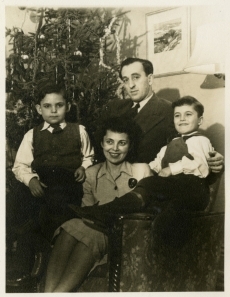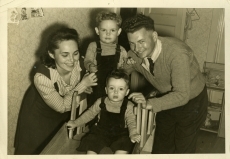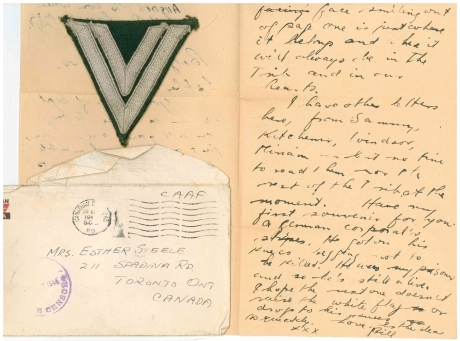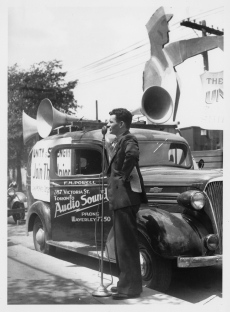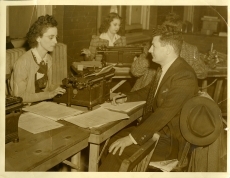Ideas, adventure, activism, internment, war, love: the lives of Dick Steele, Bill Walsh, and Esther Slominsky hold the elements of an epic novel. Steele, a tank driver in the Canadian Army, died at the Falaise Gap during the Allied invasion of German-occupied France on 17 August 1944. He left behind his young wife, Esther, and their twin sons, Michael and John, in Toronto. Bill Walsh, also positioned on the front, heard about his best friend Dick’s death after several anxious weeks in the chaos of war. Walsh had lost his wife Anne (Weir), just a year before. Bill vowed to Esther that he would come home from the war and help take care of the boys.
This aspect of their story alone is tragic and beautiful. But there is so much more to discover in the records. In another letter from the front Bill wrote to Esther on 2 October 1944: “Have my first souvenir for you. A German corporal’s stripes. He got on his knees begging not to be killed. He was my prisoner and so he’s still alive. I hope the next one doesn’t raise the white flag or drop to his knees so quickly. Love, Esther dear xxx Bill.”
With this expressed passion and proven example of fighting Nazis it is amazing that the Government of Canada and the RCMP worked so hard to prevent Dick Steele, Bill Walsh, and over one hundred of their Communist comrades from enlisting in the armed forces.
Dick Steele (short for Richard Kenilworth Steele) was the adopted name of Montreal-born Moses Kosowatsky. Dick met William “Bill” Walsh (born Moishe Wolofsky) while attending Commercial High School in Montreal. Bill’s father was Herschel Wolofsky, editor of the Keneder Adler. From the moment of Bill and Dick’s first meeting, their lives became entwined. Dick followed Bill to New York City to work and study at Columbia University. Bill was working as a runner on Wall Street and at Western Union on the day that the stock market crashed.
Having enough of the hustle of trying to survive in New York City during the Depression, Bill and Dick decided to travel to Europe. In 1931, they found a job on a boat sailing to Denmark and from there hitchhiked though Europe ending up as factory workers in the Soviet Union. Their adventure is documented in their memoir From the Land of Despair to the Land of Promise and was commissioned by the Comintern (Communist International). The opening line of chapter 1—“The Making of Bourgeois Ideology in the School”—is addressed to “G,” who had been elected valedictorian of Montreal’s Baron Byng High School, the Protestant school with a 99 percent Jewish student population. The authors hoped that “the following reminiscences may perhaps help you in your criticism of a system which is responsible for the illusory dreams and stagnation of the middle classes and their total ignorance of the ‘Class Struggle.’” This journey inspired them to become Communists.
In 1933, Herschel went on a Canadian diplomatic mission to Poland and took a side trip to Moscow to take Bill home. Bill sought the guidance of the Comintern, who advised him to return to Montreal with his father. Back in Montreal, he waited to make contact with the Communist Party. At the time, members of the Communist Party of Canada (CPC) were being targeted for arrest by R. B. Bennett’s Conservative government under Section 98 of Canada’s Criminal Code. Eventually, Bill connected with other Jewish Communists and labour organizers Lea Roback, Sidney Sarkin, and Fred Rose. At the request of Rose, Bill hosted members of the Worker’s Unity League, who were in town for a convention including Joshua Gershman and Charlie Sims. Sims encouraged Bill to move to Toronto.
Bill arrived in Toronto in 1934 in time for May Day. On his first day of work as education director at the Industrial Union of Needle Trade Workers (a union whose leadership was dominated by Communists), he met Esther Slominsky, the organization’s office manager. They became comrades and friends. Bill introduced Esther to Dick when he arrived in Toronto, and they later married. Michael and John Steele were born in 1940.
Dick and Bill became active union organizers and worked in various locations around Ontario. Dick, a trained metal worker, became an organizer for the Steel Workers Organizing Committee of Canada and the Congress of Industrial Organizations. Bill worked to organize rubber workers into an industrial union in Kitchener and the Auto Workers of Canada in Windsor. Both were members of the CPC.
In August 1939, Germany and the Soviet Union signed a non-aggression pact. The following month, on 1 September, Germany invaded Poland. Britain and France declared war two days later. Following this, the Comintern ordered all Communist Parties around the world to oppose the “imperialist” war. Canadian prime minister William Lyon Mackenzie King’s Liberal government enacted the War Measures Act on 10 September, which gave the RCMP greater power to crack down on Communists who they claimed were pro-fascist and a threat to Canada’s security. Members of the CPC subsequently went underground. It is at this time that Dick Steele began to sign his letters to Esther as “Jack,” the name adopted by his brother Mortimer when he fought and died in the Spanish Civil War.
On New Year’s Eve 1941, after a secret rendezvous in London, Ontario with Dick and with Bill’s brother-in-law Charlie Weir, Bill was arrested by the RCMP. Dick had returned to Hamilton a few days prior and thus had avoided the arrest. Bill was sent first to the Ontario Reformatory at Guelph, and then to an internment camp in Hull with 60 other Communists.
In November 1941, after Mackenzie King's call for enlistment, Dick wrote to the Department of Justice to ask permission to join the army. He never received a reply. On 1 April 1942, Dick's home was raided and he was interned at the Don Jail until September 1942 when he was moved to the Ontario Reformatory in Guelph.
Major public campaigning by Communists and the wartime alliance with the USSR after 1941 shifted public opinion toward the CPC and the Canadian government slowly began releasing internees in January 1942. Dick was released in October 1942 and enlisted at the end of the month.
Bill was released in October 1942. After getting married in Montreal, Bill and Anne were sent by the CPC to Windsor. In 1943, Anne died tragically in Bill’s arms, possibly from drinking unpasteurized milk. Bill enlisted in the Canadian army after her death. Bill and Dick were able to briefly reunite during the war while both were posted in England.
At the end of the war, and following Dick’s death at the front, Bill returned to Toronto and married Esther in 1946. Esther was working for the United Electrical Workers (UE), and Bill was invited to join their Hamilton region where he remained for twenty years. He was in Hamilton during the Stelco strike of 1946. Their daughter Sheri was born in Hamilton in 1956. Bill remained a member of the CPC until 1967, and the family were longtime members of the United Jewish People’s Order. Bill died in 2004. Esther passed away in 2010 at age ninety-six.
The documents, photographs and sound recordings in the Steele and Walsh fonds help preserve an important part of Canadian Jewish history. The Canadian Jewish Congress, which started both the Ontario Jewish Archives (1973) and the Canadian Jewish Congress Archives (1934), expelled its Communist members after the Second World War and subsequently made little effort to collect the records of Communists during the following decades. Records of Jewish Communists were historically scattered to various Canadian archives. With the acquisition of the Steele and Walsh family fonds, the OJA helps expand the availability of primary sources on Jewish individuals involved in the labour-progressive movement in Ontario, of Jewish Communists who were interned during the Second World War and of those who fought in it.
Click here to learn more about the Steele and Walsh Family fonds.
Stephanie Tara Schwartz, PhD
Researcher and Writer, Ontario Jewish Archives
